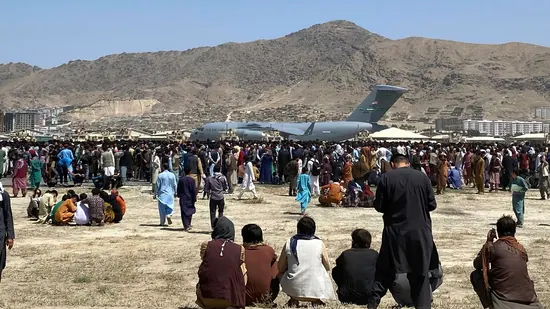
With the Taliban in firm control of Afghanistan after the fall of Kabul on Sunday, there has been an exodus of people, both Afghan nationals and expats, trying to get out of the country as fast as they can. Amidst the chaotic scenes seen at Kabul airport, there are frantic calls from different quarters to save the lives of Nepalis stranded in Afghanistan and evacuate them at the earliest. The National Human Rights Commission on Tuesday met with officials of the Ministry of Foreign Affairs (MOFA) and showed grave concern over reports that many Nepalis had been unable to feed themselves and were without shelter. According to government records, there are about 1,500 Nepalis in Afghanistan who had taken labour permits. However, many times more Nepalis are said to be working there having reached there via third countries. Given the chaotic situation prevailing in Afghanistan, it would be naïve to expect the Taliban government or anyone, for that matter, to assist a foreigner. One can only gauge the hardships that the stranded Nepalis are facing in Kabul and elsewhere.
According to the Department of Immigration, as of Tuesday, 164 Nepalis had arrived Kathmandu from Afghanistan after August 5 when foreigners started fleeing the country. Those who arrived are among the 385 Nepalis, mostly providing security to U.S. facilities, who were airlifted by the U.S. Army a few days ago. There are many more Nepalis working as security personnel in various embassies or in other informal sectors, who are awaiting evacuation.
Absence of information about the exact number of Nepalis working in Afghanistan makes it difficult for the government to plan the rescue operation.
Some sections of the media have been reporting there are as many as 12,000-14,000 Nepalis in the war-torn country, a figure refuted by the government. At this point, only the labour exporting agencies will have records of those Nepalis who have gone to Afghanistan for work, mostly as security personnel.
Things might not have been so anarchic in Afghanistan had the country not fallen to the Taliban so quickly. Just last week, the U.S. government was sure of itself that it would take at least 90 days before the advancing Taliban could take over Kabul, which gave everyone plenty of time to leave the country. But no one expected the capital to collapse without so much as a fight with the Taliban or the President, Ashraf Ghani, to flee the country. While Prime Minister Deuba's government has shown its resolve to airlift its citizens as early as possible, flying into crowded Kabul airport is not that easy, with many countries trying desperately to get their citizens out of the country first. And no one knows how many sorties will be required to airlift all of our citizens. MoFA has opened an online registration form for Nepalis to collect relevant data of those awaiting help. The Nepalis, on their part, must register as quickly as possible so as to ensure effective and swift rescue. Unless they can be evacuated, the government must ensure their safety as well as food and shelter. Hopefully, with the Taliban demonstrating moderate gestures in recent days, things will return to normal sooner than later.
Woes of the victims
The families in Dhankuta whose houses were destroyed by the monsoon-related disasters last year have not been able to reconstruct their houses due to lack of funds. Floods and landslides in the district had swept away human settlements, roads and farmlands. The District Disaster Management Committee had recommended that 55 houses needed to be repaired, 80 others reconstructed and 99 households relocated. Despite the panel's recommendation, they are still living in temporary shelters made of zinc sheets and tarpaulin.
As Nepal is a mountainous country, floods and landslides that occur mainly during the monsoon season render hundreds of families homeless and an equal number of them are forced to leave their ancestral land. Their relocation and rehabilitation are the challenging task for the government. But sad to say, the government does not have a long-term plan, policy and funds to systematically rehabilitate the families affected by the natural disasters. A separate ministry at the centre solely dedicated to rehabilitating the disaster victims is the need of the hour as the incidents of natural disasters are rising every year due to climate change. A similar mechanism can also be formed at the sub-national levels.












